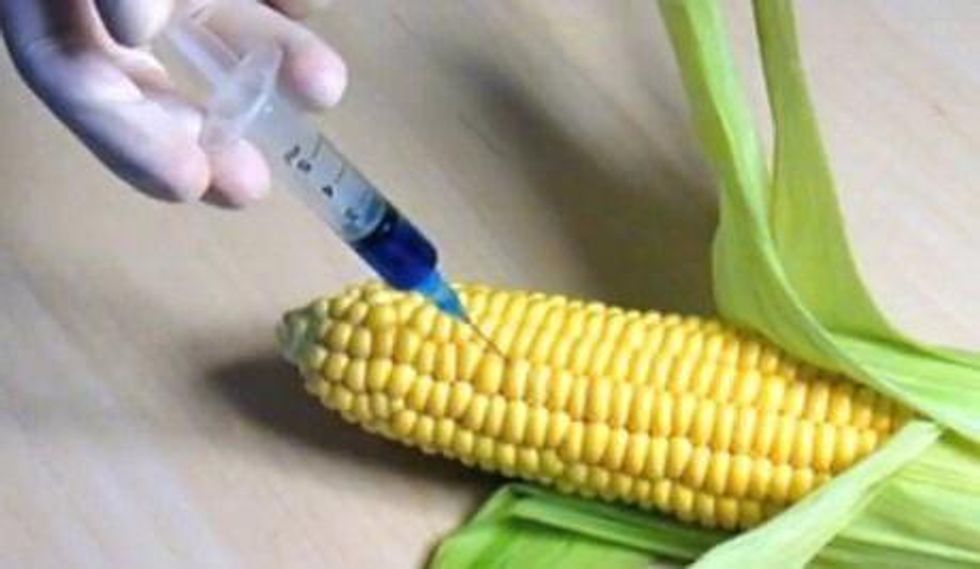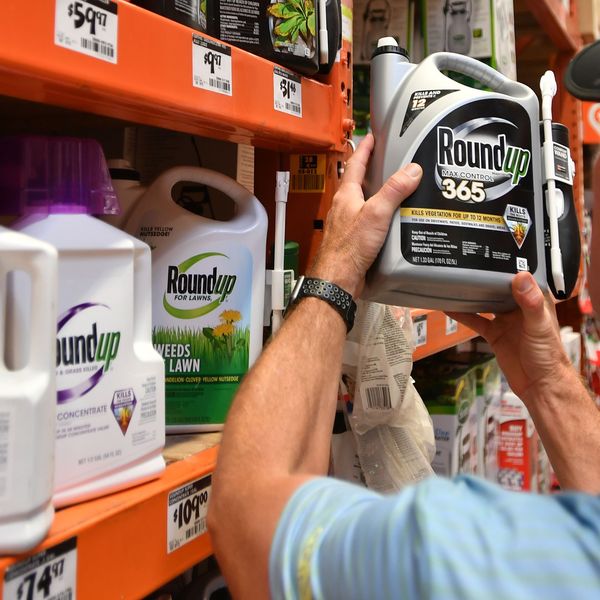Pesticide Use Spikes as GMO Failure Cripples Corn Belt
Midwest farmers douse their fields in chemicals as insects grow resistant to Bt Corn

Pesticide use is skyrocketing across the Midwestern U.S. corn belt, as biotech companies like Syngenta and AMVAC Chemical watch their pesticide sales spike 50 to 100 percent over the past two years, NPR reported Tuesday.
The culprit? Bt corn--a type of genetically engineered corn with insecticide built into its genes.
Variations of this corn strain--peddled across the world by large multinationals including Monstanto and Syngenta--are giving rise to Bt resistant insects and worms, studies show.
NPR reports that resistant 'pests' are decimating entire cornfields across Illinois, Iowa, Minnesota and Nebraska.
Yet, now that the targeted insect killings are not working, big agribusiness is simply throwing pesticides at the problem instead of moving away from GMOs.
This is despite warnings last year from the Environmental Protection Agency that unrestrained use of Bt corn will off-set the balance of the ecosystem.
Monsanto denies the severity of the damage wrought by Bt corn, assuring customers that many farmers 'have great success.'
Environmental groups have long warned that Bt corn is a danger to non-'pest' insects. In a 2004 briefing, Greenpeace showed that the effects of non-targeted insect killings ripple throughout the ecosystem.
Critics charge that the modified corn--which is spread by big agribusiness, pushed to small farmers, and crossbred with non GMO strains--undermines food diversity and security and devastates small-scale, sustainable farmers and peasants.
The revelation comes after scientists recently warned that pollution runoff from Midwestern farms, carried to the ocean by the Mississippi, is slated to create the largest ocean dead zone recorded in the Gulf of Mexico, choking marine life that crosses its path.

_____________________
An Urgent Message From Our Co-Founder
Dear Common Dreams reader, The U.S. is on a fast track to authoritarianism like nothing I've ever seen. Meanwhile, corporate news outlets are utterly capitulating to Trump, twisting their coverage to avoid drawing his ire while lining up to stuff cash in his pockets. That's why I believe that Common Dreams is doing the best and most consequential reporting that we've ever done. Our small but mighty team is a progressive reporting powerhouse, covering the news every day that the corporate media never will. Our mission has always been simple: To inform. To inspire. And to ignite change for the common good. Now here's the key piece that I want all our readers to understand: None of this would be possible without your financial support. That's not just some fundraising cliche. It's the absolute and literal truth. We don't accept corporate advertising and never will. We don't have a paywall because we don't think people should be blocked from critical news based on their ability to pay. Everything we do is funded by the donations of readers like you. Will you donate now to help power the nonprofit, independent reporting of Common Dreams? Thank you for being a vital member of our community. Together, we can keep independent journalism alive when it’s needed most. - Craig Brown, Co-founder |

Pesticide use is skyrocketing across the Midwestern U.S. corn belt, as biotech companies like Syngenta and AMVAC Chemical watch their pesticide sales spike 50 to 100 percent over the past two years, NPR reported Tuesday.
The culprit? Bt corn--a type of genetically engineered corn with insecticide built into its genes.
Variations of this corn strain--peddled across the world by large multinationals including Monstanto and Syngenta--are giving rise to Bt resistant insects and worms, studies show.
NPR reports that resistant 'pests' are decimating entire cornfields across Illinois, Iowa, Minnesota and Nebraska.
Yet, now that the targeted insect killings are not working, big agribusiness is simply throwing pesticides at the problem instead of moving away from GMOs.
This is despite warnings last year from the Environmental Protection Agency that unrestrained use of Bt corn will off-set the balance of the ecosystem.
Monsanto denies the severity of the damage wrought by Bt corn, assuring customers that many farmers 'have great success.'
Environmental groups have long warned that Bt corn is a danger to non-'pest' insects. In a 2004 briefing, Greenpeace showed that the effects of non-targeted insect killings ripple throughout the ecosystem.
Critics charge that the modified corn--which is spread by big agribusiness, pushed to small farmers, and crossbred with non GMO strains--undermines food diversity and security and devastates small-scale, sustainable farmers and peasants.
The revelation comes after scientists recently warned that pollution runoff from Midwestern farms, carried to the ocean by the Mississippi, is slated to create the largest ocean dead zone recorded in the Gulf of Mexico, choking marine life that crosses its path.

_____________________

Pesticide use is skyrocketing across the Midwestern U.S. corn belt, as biotech companies like Syngenta and AMVAC Chemical watch their pesticide sales spike 50 to 100 percent over the past two years, NPR reported Tuesday.
The culprit? Bt corn--a type of genetically engineered corn with insecticide built into its genes.
Variations of this corn strain--peddled across the world by large multinationals including Monstanto and Syngenta--are giving rise to Bt resistant insects and worms, studies show.
NPR reports that resistant 'pests' are decimating entire cornfields across Illinois, Iowa, Minnesota and Nebraska.
Yet, now that the targeted insect killings are not working, big agribusiness is simply throwing pesticides at the problem instead of moving away from GMOs.
This is despite warnings last year from the Environmental Protection Agency that unrestrained use of Bt corn will off-set the balance of the ecosystem.
Monsanto denies the severity of the damage wrought by Bt corn, assuring customers that many farmers 'have great success.'
Environmental groups have long warned that Bt corn is a danger to non-'pest' insects. In a 2004 briefing, Greenpeace showed that the effects of non-targeted insect killings ripple throughout the ecosystem.
Critics charge that the modified corn--which is spread by big agribusiness, pushed to small farmers, and crossbred with non GMO strains--undermines food diversity and security and devastates small-scale, sustainable farmers and peasants.
The revelation comes after scientists recently warned that pollution runoff from Midwestern farms, carried to the ocean by the Mississippi, is slated to create the largest ocean dead zone recorded in the Gulf of Mexico, choking marine life that crosses its path.

_____________________

